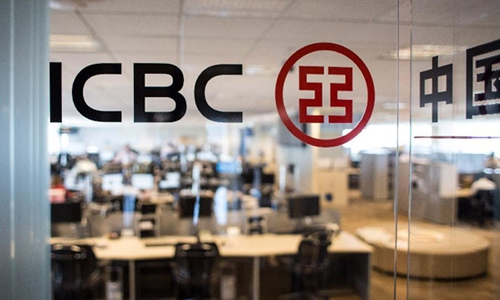
A branch of Industrial and Commercial Bank of China. File Photo: Xinhua
The Communist Party of China's (CPC) top disciplinary agency has sent teams to big Chinese commercial banks on missions to ensure Party central committee's financial support policies to the economy are fully implemented, according to a statement posted on Thursday on the website of Central Commission for Discipline Inspection (CCDI).
Teams comprised of disciplinary officials sent to top Chinese commercial banks from the Industrial and Commercial Bank of China (ICBC) to the Bank of Communications have played a role in encouraging banks to lend financial support to the real economy and ensure Party policy on shoring up economy takes its intended effect, the statement said.
Experts said the role of disciplinary officials serves to foster implementation, without which supportive policies will become empty words, as the country's new yuan loans slowed markedly in April.
In April, affected by domestic Omicron epidemic flare-ups, new yuan loans reached 645.4 billion yuan ($95.12 billion), down sharply from March's 3.13 trillion yuan, central bank data showed in mid-May.
At the ICBC, disciplinary officials are focusing and tracking how the bank is serving the manufacturing sector by setting up a political inspection book of accounts.
At the prompt of inspectors, ICBC's outstanding loans to the manufacturing sector increased by 403.5 billion yuan to 2.57 trillion yuan from January to April. The net loan increase quadrupled the amount of increase recorded in the same period in 2021.
Ensuring the sound development of the real economy is a political as well as social responsibility for state-owned financial institutions, the statement said, citing a disciplinary official stationed at ICBC.
At China Construction Bank, disciplinary officials prompted the bank's business and administrative sections to implement policies by the central government to support small- and medium-sized enterprises and open up green passages over the loan review and approval pipeline for key companies to obtain loans sooner.
At Agricultural Bank of China, disciplinary officials tracked and monitored the loan data to projects under rural revitalization initiative, and reminded bank executives when a contraction in credit extension is noticed. They also focused on anticorruption work in the financial sector, a move indispensable to help stem financial risks. In the first quarter, ABC extended over 1 trillion yuan in credit to the real economy and its loan growth to key sectors of rural revitalization outstripped average loan growth.
Two bank executives at two bank branches in Northeast China's Heilongjiang were penalized for extending fake rural loans.
At Bank of Communications, disciplinary officials encouraged bank management to revise and update its accountability regulation on nonperforming assts.
In a campaign to crack down on financial sector corruption, disciplinary inspectors penalized 10 bank employees at the Bank of China over illegally extending bank loans as of mid-May after reviewing 419 projects.
State-owned commercial banks represent the bulk of China's credit lending organizations. The top five banks - ICBC, CBC, ABC, BOC, BOCOM - accounted for over half of all loans extended.
Experts said as the Chinese economy faces unexpected difficulties after the first quarter following Omicron outbreaks paralyzing mega cities including Shanghai and Beijing, the lending of credit by state-owned commercial banks to needy enterprises, especially smaller ones, is a key aspect in the overall battle to fight the economic onslaught of the epidemic.
State-owned commercial banks have the obligation to support the national policy of shoring up the economy, Dong Dengxin, director of the Finance and Securities Institute of the Wuhan University of Science and Technology, told the Global Times on Thursday.
This is something Western government could not ask their banks to do, as their banks are privately held and purely profit oriented, Dong said.
Disciplinary inspectors are a necessary role as they prompt bank management to implement state policies and extend credit, reversing an "understandable" tendency by banks to be unwilling to lend in order to avoid losses at this critical juncture, Dong said.
The Chinese government has highlighted the need to strengthen support in key areas such as epidemic-hit enterprises, owners of micro- and small enterprises and individual businesses. The People's Bank of China, the central bank, announced 23 steps to provide financial services for socioeconomic development and coronavirus prevention and control in April, cut the reserve requirement ratio to increase long-term capital supply for domestic financial institutions and lowered interest rates.
The enhanced presence of disciplinary inspectors also means data released by banks on credit extensions are more transparent and credible, as the disciplinary watchdog has increased oversight over the entire process.
Years ago, state-owned commercial banks performed similar roles when they salvaged state-owned enterprises in bad financial shape.




